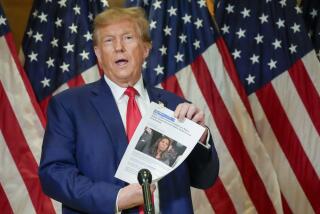Judge Sets Limits on Imelda Marcos’ Spending : Fraud suit: She must have approval for outlays exceeding $10,000. The order is a major victory for the Philippine government in action seeking to recover $5 billion.
- Share via
The Philippine government, seeking to recover billions of dollars allegedly stolen from the country by its late president, Ferdinand E. Marcos and his wife, Imelda, won a major victory Monday when a Los Angeles federal judge placed new spending restraints on the former first lady.
Under the order by U.S. District Judge Mariana R. Pfaelzer, Imelda Marcos will have to seek court approval of any expenditure exceeding $10,000, except for the payment of attorneys fees and court costs. She will also have to report any loan exceeding $10,000 and must file a monthly report with the court detailing expenditures and accounting for all loans or gifts.
Pfaelzer acted on motions by lawyers for the Philippine government who, in a massive civil fraud suit, are trying to recover $5 billion the Marcoses allegedly looted from the island nation.
Ferdinand Marcos, who fled the Philippines in 1986 after Corazon Aquino was elected president, died in exile in Honolulu on Sept. 28 after a long illness.
When the Los Angeles suit was filed in June, 1986, Pfaelzer issued a freeze on the Marcoses’ assets worldwide, pending trial.
In October, attorneys Alan D. Bersin and Michael R. Doyen of the Los Angeles firm of Munger, Tolles & Olson asserted in court papers that the Marcoses and several of their business associates had violated the freeze on many occasions. The attorneys, in urging the court to impose further restraints, alleged in voluminous documents that the violations included transfers of properties the Marcoses owned in New York and Hawaii and manipulation of various foreign bank accounts.
“You’ve certainly made a good showing that the original order was violated,” Pfaelzer said in granting the motion Monday.
The lawyers asserted that the Marcoses “fraudulently transferred” to Saudi arms merchant Adnan Khashoggi ownership and control of two New York buildings, four related corporations and at least one Swiss bank account in excess of $100 million.
The motion asserted that documents were illegally back-dated in an attempt to transfer the Marcoses’ holdings to Khashoggi while getting around Pfaelzer’s 1986 injunction.
The court papers filed in October also alleged that the Marcoses violated the injunction by spending $2.8 million and encumbering an additional $200 million in their Swiss bank accounts to purchase arms for a planned invasion of the Philippines.
The court papers further asserted that the Marcoses violated the injunction by transferring ownership of their large Honolulu home to a corporation in England.
Also named in the civil racketeering case against the Marcoses are Khashoggi and others, including Robert Benedicto, a major shareholder in a California bank. Benedicto is a fugitive from similar, but criminal, charges in New York.
The New York indictment, issued in October, 1988, alleges that the Marcoses, Khashoggi, Benedicto, six others and California Overseas Bank engaged in a massive racketeering scheme of fraud, embezzlement, bribery and obstruction of justice.
Richard A. Hibey, Imelda Marcos’ Washington-based lawyer, opposed tightening the Los Angeles injunction on several grounds. He asserted that the alleged violations occurred some time ago and that he should be allowed to cross-examine some of the individuals who had filed written declarations in the case.
Hibey also contended that, if his client were ordered to file monthly reports, it would violate her Fifth Amendment rights against self-incrimination, because such a ruling would require her to provide information that could be used against her in a New York criminal fraud case set for trial in March.
Many of the allegations in that case are similar to the charges in the civil case in Los Angeles. Both cases describe elaborate money-laundering schemes, secret bank accounts in Switzerland, Hong Kong, Panama and other places, and falsified documents designed to thwart investigators.
Hibey said the New York case alleges that there is no amount of money that Imelda Marcos possesses that does not belong to the Philippine government. Therefore, he said, any information she would provide in monthly reports to the Los Angeles court could be used against her in the New York case.
Pfaelzer rejected the argument. The judge did, however, modify the original proposal of he Philippine government, which would have required Imelda Marcos to seek approval for any expenditure exceeding $5,000.
Hibey said he was “not surprised” by Pfaelzer’s decision, which could not be appealed at this stage of the case.
Bersin, one of the lawyers for the Philippines, called Pfaelzer’s ruling “a very important step forward” in the country’s efforts to regain funds it claims the Marcoses stole.
“We consider it a very important indication by the court that Mrs. Marcos can’t, with impunity, ignore the freeze order” issued by Pfaelzer in June, 1986, “with regard to assets the Philippines claims. It should have a prophylactic effect.”
If Marcos violates Pfaelzer’s new order, she could be fined up to $1 million for each violation. Hibey argued, to no avail, that the penalty would be excessive.
The Philippine Commission on Good Government has been conducting an extensive search to find assets it claims the Marcoses and their associates stole.
Bersin said Monday, “I can state with certainty we don’t know where all the assets are. . . . The Philippine government is aware of substantial bank accounts in Switzerland and property in the United States.”
Trial in the Los Angeles case will not begin until the New York matter is resolved.
In addition to the civil racketeering charges, the Los Angeles suit alleges that the Marcoses stole money from government-owned financial institutions, converted to their own use foreign aid money designed to benefit Filipino citizens and engaged in illegal money-laundering to conceal the funds from authorities.
More to Read
Sign up for Essential California
The most important California stories and recommendations in your inbox every morning.
You may occasionally receive promotional content from the Los Angeles Times.













